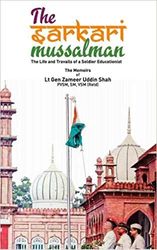Actor Naseeruddin Shah in Army uniform? Must have joined the Territorial Army.
That was what this reviewer, undergoing the Defence Correspondents Course in the College of Combat at Mhow, in 1993, thought when a colonel walked into the classroom.
The colonel has since retired as a lieutenant-general, having served as a corps commander and a deputy chief. But he hasn't outgrown those moments when many mistook him for his brother who had beaten to him to celebrity status. In the second chapter of his memoirs, Lt Gen Zameer Uddin Shah tells us of more moments of glory and embarrassment that he had faced “under the shadow of a celebrity brother”.
But that's only one chapter in this book. The rest are about the life and times of a doughty Army officer who served in the desert and in the jungles, rode camels, fired cannons, fought Pakistanis and insurgents, dined with diplomats, delivered justice as a member of the military tribunal, and finally had runs-in with politicians while serving as a vice-chancellor.
Zameer had served in the Indian Army's last camel regiment, and was there at Longewala in 1971, commanding an artillery battery, firing at the Pakistani tanks and holding on till the IAF came to the Army's rescue. He took prisoners, and marched into Pakistan with his regiment. The Longewala action has been immortalised in the film, Border.
Though Zameer doesn't make a mention of it, it is clear from the book that India had received help from Israel in the war. The desert vehicles that he rode had markings in Hebrew. It is also clear from the narrative that it was the Indian Army's celebrated Jew officer, Lt Gen J.F.R. Jacob (then a major-general), who persuaded the Army to give up camels and use motor vehicles in the desert.
This Jew seemed to have a fondness for the young Muslim. In Jacob's eyes, Zameer had “a Jewish nose”. As eastern Army commander, Jacob picked Zameer as his staff officer. (Later Jacob would write a notoriously boastful book about his role in the 1971 war, denigrating Gen Sam Manekshaw and the then eastern commander Lt Gen J.S. Aurora. The book received an extremely nasty review in THE WEEK. Now, Zameer tells us in this book that Jacob's first manuscript had been even more disdainful towards his two bosses, and that Zameer was instrumental in toning it down! Yes, general, you have always been a gentleman.)
Zameer went to on serve the Army, fighting insurgencies in the northeast several times and in Punjab, and rose to be a corps commander. It was while he was commanding a strike corps that terrorists attacked the Indian Parliament, and he was directed by Gen S. Padmanabhan to mobilise for Operation Parakram.
From there he was lifted to quell the post-Godhra riots in Gujarat. The book has a brief reference to the state government's lack of enthusiasm in cooperating with the Army to quell the riots. There was delay in providing the Army with vehicles, and Zameer had to drive to then chief minister Narendra Modi's house at 2am to remind him.
Zameer claims to have told Defence Minister George Fernandes that Gujarat's police hierarchy needed an overhaul, and that an officer from another cadre should be brought in to head the force. “We waited but there was no change.”
All the same, the general has refrained from making any direct attacks on the chief minister or on his conduct.
But he is not so cautious about the controversies that dogged him while serving as vice-chancellor of Aligarh Muslim University. Zameer blames a Congress Rajya Sabha member, whom he does not name, for having poisoned HRD Minister Smriti Irani's mind against him. His first meeting with the minister itself was a disaster, and the book gives details of more runs-in. All the same, Zameer says that the prime minister had been kind to him, and had given him a patient hearing.
On the whole, Zameer has brought out a highly readable, but not spicy, account of not just his life, but of the Army, and the times we live in. There is no rancour in the tone or style, but only a refreshing look-back, more with amusement than boasts or blame.
Jolly good, General.
The Sarkari Mussalman
Author: Lt Gen Zameer Uddin Shah
Publisher: Konark Publishers
Pages: 185
Price: Rs 695



